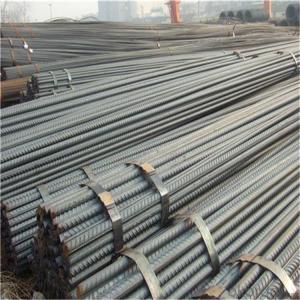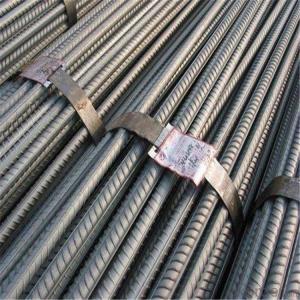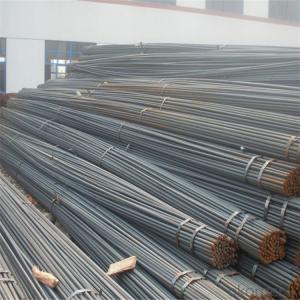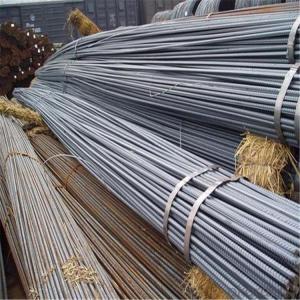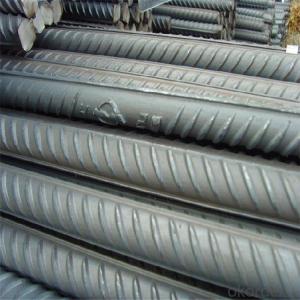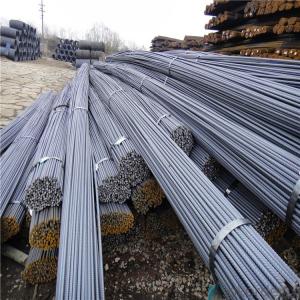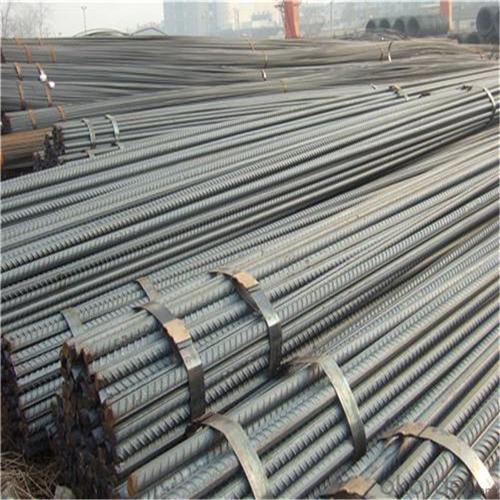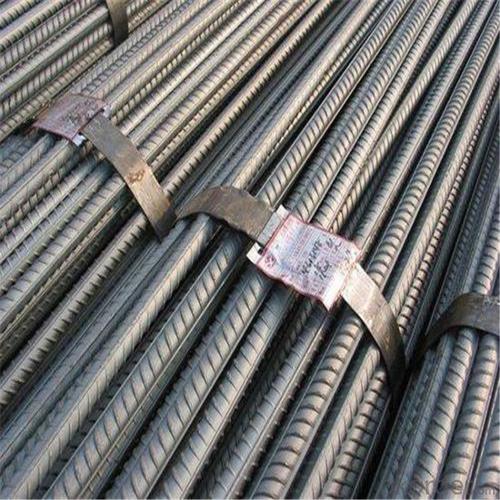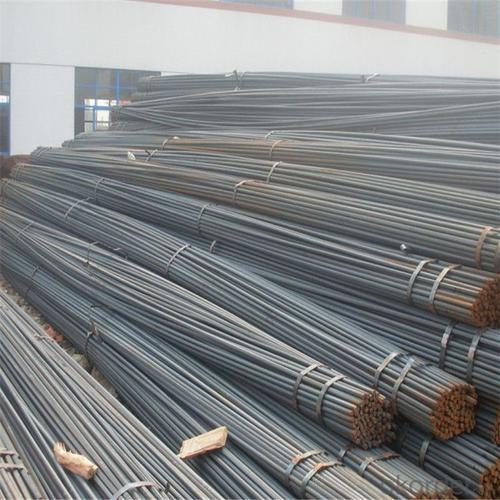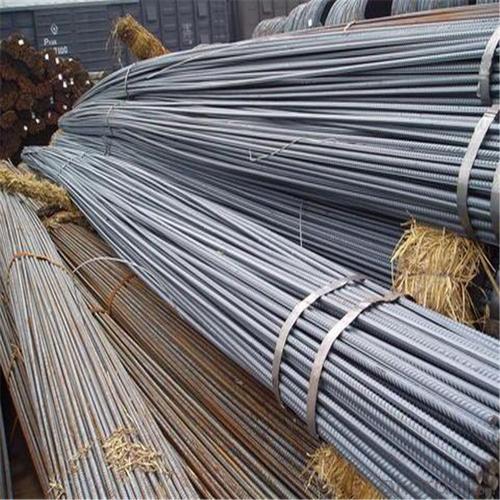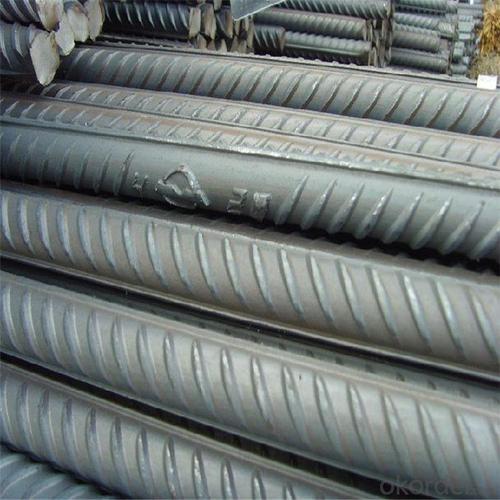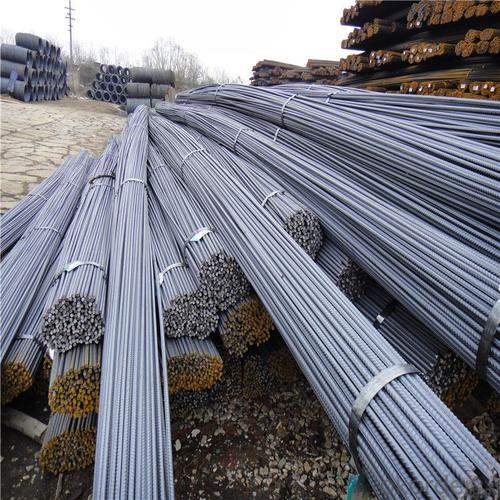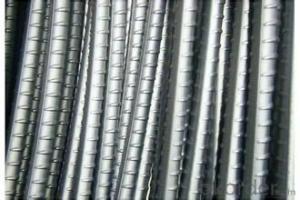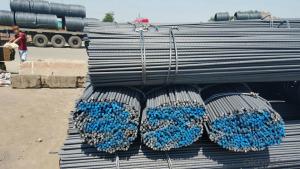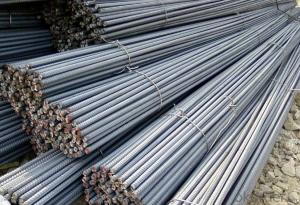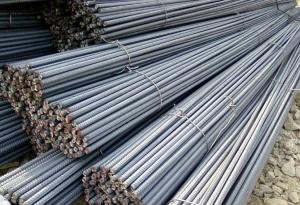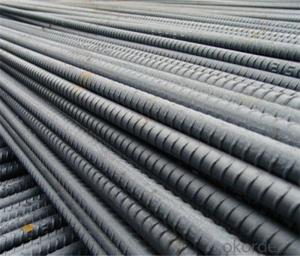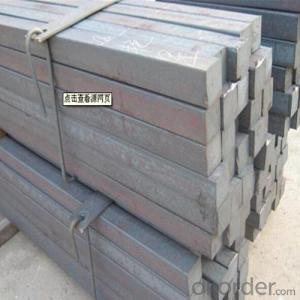Bending Deformed Bar For Container
- Loading Port:
- Tianjin
- Payment Terms:
- TT OR LC
- Min Order Qty:
- 160 m.t.
- Supply Capability:
- 50000 m.t./month
OKorder Service Pledge
OKorder Financial Service
You Might Also Like
Specification
Bending Deformed Bar For Container
Description of Bending Deformed Bar For Container
1, Diameter: 5.5mm-10mm Bending Deformed Bar For Container
10m- 40mm Bending Deformed Bar For Container
2, Length: 6m, 9m, 12m or customized
3, Standard: GB, ASTM, AISI, SAE, DIN, JIS, EN
OEM technology - send detailed technical parameters for accurate quotation.
2, Produce Process: smelt iron - EAF smelt billet - ESR smelt billet -
hot rolled or forged to get the steel round bar and plate
3, Heat Treatment: annealing, normalizing, tempering, quenching
4, Surface Treatment: Black
5, Quality Assurance: We accept third party inspection for all orders.
You can ask testing organizations such as SGS, BV, etc. to test our products before shipping.
Chemical Composition of Bending Deformed Bar For Container
Grade | Technical data of the original chemical composition(%) | |||||
Reinforcing steel bar HRB335 | C | Mn | Si | S | P | B |
≤0.25 | ≤1.60 | ≤0.80 | ≤0.045 | ≤0.045 | >0.0008 | |
Physics Capability | ||||||
Yield Strength(N/cm2) | Tensile Strength(N/cm2) | Elongation(%) | ||||
≥ 335 | ≥490 | ≥16 | ||||
Reinforcing steel bar HRB400 | C | Mn | Si | S | P | B |
≤0.25 | ≤0.16 | ≤0.80 | ≤0.045 | ≤0.045 | 0.04-0.12 | |
Physics Capability | ||||||
Yield Strength(N/cm2) | Tensile Strength(N/cm2) | Elongation(%) | ||||
≥ 400 | ≥ 570 | ≥ 14 | ||||
Products Show of Bending Deformed Bar For Container
Company Information
CNBM International Corporation is the most important trading platform of CNBM group.
Whith its advantages, CNBM International are mainly concentrate on Cement, Glass, Iron and Steel, Ceramics industries and devotes herself for supplying high qulity series of refractories as well as technical consultancies and logistics solutions.


F A Q
1, Your advantages?
professional products inquiry, products knowledge train (for agents), smooth goods delivery, excellent customer solution proposale
2, Test & Certificate?
SGS test is available, customer inspection before shipping is welcome, third party inspection is no problem
3, Factory or Trading Company?
CNBM is a trading company but we have so many protocol factories and CNBM works as a trading department of these factories. Also CNBM is the holding company of many factories.
4, Payment Terms?
30% TT as deposit and 70% before delivery.
Irrevocable L/C at sight.
5, Trading Terms?
EXW, FOB, CIF, FFR, CNF
6, After-sale Service?
CNBM provides the services and support you need for every step of our cooperation. We're the business partner you can trust.
For any problem, please kindly contact us at any your convenient time.
We'll reply you in our first priority within 24 hours.
- Q: How is stainless steel used in food processing?
- Stainless steel is widely used in food processing due to its hygienic properties, durability, and resistance to corrosion. It is used to manufacture various equipment and components such as storage tanks, piping systems, mixing tanks, cutting tools, and food preparation surfaces. The non-reactive nature of stainless steel prevents it from imparting any flavors or odors to the food, ensuring its purity and maintaining the quality of the final product. Additionally, stainless steel's smooth and easy-to-clean surface makes it suitable for maintaining high levels of hygiene, reducing the risk of contamination in food processing facilities.
- Q: What are the different surface treatment methods for special steel?
- There are several surface treatment methods for special steel, including but not limited to: hot-dip galvanizing, electroplating, powder coating, painting, and nitriding. Each method offers unique benefits and is chosen based on the specific requirements of the application, such as corrosion resistance, aesthetic appeal, or improved hardness.
- Q: What are the properties of shock-resistant alloy steel?
- Shock-resistant alloy steel is known for its exceptional toughness and ability to withstand high impact and shock loads. It possesses a unique combination of strength, hardness, and ductility, making it ideal for applications in industries such as aerospace, automotive, and manufacturing. This type of steel undergoes specialized heat treatment processes to enhance its shock-resistance, thereby ensuring it can absorb and dissipate energy without fracturing or deforming. Additionally, shock-resistant alloy steel exhibits excellent corrosion resistance and can maintain its mechanical properties even in harsh environments, making it a reliable and durable material for various demanding applications.
- Q: What are the requirements for special steel used in cryogenic applications?
- To ensure optimal performance and reliability in extremely low-temperature environments, special steel employed in cryogenic applications must fulfill a range of prerequisites. First and foremost, the steel must exhibit exceptional low-temperature toughness, enabling it to endure the extreme cold without succumbing to brittle fracture or compromising its mechanical properties. It is imperative that the steel possesses high toughness and ductility to effectively absorb impacts and prevent cracking. Moreover, the steel must possess a low coefficient of thermal expansion. This characteristic assumes significance as cryogenic applications involve substantial temperature fluctuations. A high coefficient of thermal expansion can result in dimensional instability and stress within the material. Conversely, a low coefficient of thermal expansion mitigates these effects and maintains dimensional stability. Furthermore, the steel should demonstrate low thermal conductivity. Given that cryogenic applications often entail the transfer or storage of substances at extremely low temperatures, minimizing heat transfer is essential. A low thermal conductivity aids in maintaining the desired temperature and prevents unwanted heat exchange. This aspect is particularly critical in applications where precise temperature control is paramount, such as the storage of liquefied gases. In addition, the steel must exhibit excellent corrosion resistance. Cryogenic environments can be highly corrosive, necessitating the steel's ability to withstand the detrimental effects of corrosive substances that may be present. This attribute is particularly vital in applications involving the storage or transportation of cryogenic liquids or gases. Finally, the steel should possess good weldability. Welding is often necessary to join different components or sections of the steel in cryogenic applications. Therefore, ensuring the steel's weldability is crucial to establish strong and reliable joints. In summary, the requirements for special steel used in cryogenic applications encompass exceptional low-temperature toughness, a low coefficient of thermal expansion, low thermal conductivity, excellent corrosion resistance, and good weldability. Satisfying these requirements guarantees the steel's ability to withstand the harsh conditions and extreme cold of cryogenic environments while preserving its structural integrity and performance.
- Q: Can special steel be used in the renewable energy industry?
- Yes, special steel can be used in the renewable energy industry. Special steel alloys are often used in the construction of wind turbines, solar panels, and hydroelectric power plants due to their high strength, corrosion resistance, and durability. These properties make special steel an ideal material for various components, such as turbine blades, tower structures, frames, and support systems, ensuring the reliability and longevity of renewable energy infrastructure.
- Q: How does special steel perform in pharmaceutical applications?
- Due to its unique properties and characteristics, special steel is highly sought after in pharmaceutical applications. Its exceptional corrosion resistance is especially important in pharmaceutical environments where chemical substances and aggressive cleaning agents are commonly used. This corrosion resistance ensures the steel remains durable and maintains its integrity over time. Furthermore, special steel is renowned for its strength and durability, making it suitable for applications that involve heavy loads or frequent use. This strength allows the steel to withstand the demanding requirements of pharmaceutical processes, such as mixing, grinding, and sterilization, without compromising its structural integrity. Another significant advantage of special steel in pharmaceutical applications is its hygienic properties. It is highly resistant to bacterial growth and easy to clean, making it perfect for environments where cleanliness and sterility are of utmost importance. The smooth surface of special steel prevents the accumulation of dirt, bacteria, and other contaminants, reducing the risk of contamination and ensuring the safety and quality of pharmaceutical products. Moreover, special steel offers excellent temperature resistance, enabling it to endure extreme temperatures and thermal cycling commonly encountered in pharmaceutical processes. This thermal stability guarantees that the steel retains its mechanical properties and dimensional stability, even under fluctuating temperature conditions. Overall, special steel's corrosion resistance, high strength, hygienic properties, and temperature resistance make it a trustworthy and versatile material for pharmaceutical applications. Its exceptional performance in these challenging environments contributes to the production of safe and high-quality pharmaceutical products.
- Q: What are the challenges in machining high-speed special steel?
- Several challenges arise when machining high-speed special steel due to its unique properties and characteristics. Its extreme hardness presents one of the main obstacles, making cutting and shaping difficult. High-speed special steel typically has a high carbon content and undergoes heat treatment to enhance its hardness, resulting in increased wear on cutting tools. The increased hardness of this steel also leads to elevated heat generation during the machining process. This heat can cause thermal distortion and impact the dimensional accuracy of the final product. To counteract this, specialized cooling techniques and cutting tools with advanced coatings must be used to dissipate heat and maintain stability. Another challenge is the brittleness of high-speed special steel. It tends to have low toughness and is susceptible to cracking and chipping during machining operations. To minimize the risk of tool failure and excessive stress, careful selection of cutting parameters such as cutting speed, feed rate, and depth of cut is necessary. Furthermore, high-speed special steel often contains alloying elements like tungsten, vanadium, and cobalt, which can further complicate the machining process. While these elements increase the strength and wear resistance of the steel, they also make it more challenging to machine. Effective machining of these alloys and achieving desired surface finishes requires specialized tool materials and cutting strategies. Additionally, the cost of high-speed special steel is often significantly higher than that of conventional steels, adding to the challenges of machining. The high tooling costs associated with the cutting tools required for machining this steel can be a substantial investment. Overall, machining high-speed special steel necessitates advanced cutting techniques, specialized tooling, and careful consideration of cutting parameters to overcome the challenges posed by its extreme hardness, brittleness, and alloying elements.
- Q: How does copper influence the characteristics of special steel?
- Copper can greatly influence the characteristics of special steel by improving its strength, corrosion resistance, and electrical conductivity. The addition of copper to steel enhances its overall mechanical properties, making it more durable and resistant to wear and tear. Additionally, copper helps in preventing rust and oxidation, thus increasing the steel's resistance to corrosion. Moreover, copper enhances the electrical conductivity of steel, enabling it to be effectively used in electrical applications.
- Q: What are the specific requirements for special steel used in the marine industry?
- Special steel used in the marine industry must meet specific requirements to ensure its suitability for the harsh marine environment. These requirements include high strength, corrosion resistance, and toughness. Firstly, high strength is crucial for special steel used in the marine industry as it needs to withstand the extreme loads and stresses experienced at sea. This strength allows the steel to resist deformation and maintain structural integrity under heavy loads, such as the weight of the ship itself or the forces generated by waves and wind. Corrosion resistance is another vital requirement for marine-grade steel. The presence of saltwater, which is highly corrosive, poses a significant challenge. Special steel for the marine industry should have excellent resistance to corrosion, preventing the formation of rust and other forms of degradation. This resistance ensures the longevity of the steel structures and reduces maintenance and repair costs. Toughness is also essential in marine-grade steel. It must be able to withstand impact and shock loads, as ships and offshore structures are constantly exposed to rough seas and potential collisions. The steel should possess the ability to absorb and distribute energy without fracturing or failing, ensuring the safety and reliability of the marine structures. In addition to these requirements, special steel used in the marine industry must also meet specific standards and certifications, such as those set by classification societies like the American Bureau of Shipping (ABS), Lloyd's Register (LR), or Det Norske Veritas Germanischer Lloyd (DNV GL). These organizations set standards for materials, construction, and inspection processes to ensure the reliability and safety of marine structures. Overall, the specific requirements for special steel used in the marine industry include high strength, corrosion resistance, toughness, and compliance with industry standards and certifications. Meeting these requirements ensures the steel's ability to withstand the unique challenges posed by the marine environment and helps ensure the safety and longevity of marine structures.
- Q: Can special steel be used in the computer manufacturing industry?
- Yes, special steel can be used in the computer manufacturing industry. It is often used for making computer casings, hard drive components, and other structural parts due to its high strength, durability, and resistance to corrosion.
Send your message to us
Bending Deformed Bar For Container
- Loading Port:
- Tianjin
- Payment Terms:
- TT OR LC
- Min Order Qty:
- 160 m.t.
- Supply Capability:
- 50000 m.t./month
OKorder Service Pledge
OKorder Financial Service
Similar products
Hot products
Hot Searches
Related keywords
